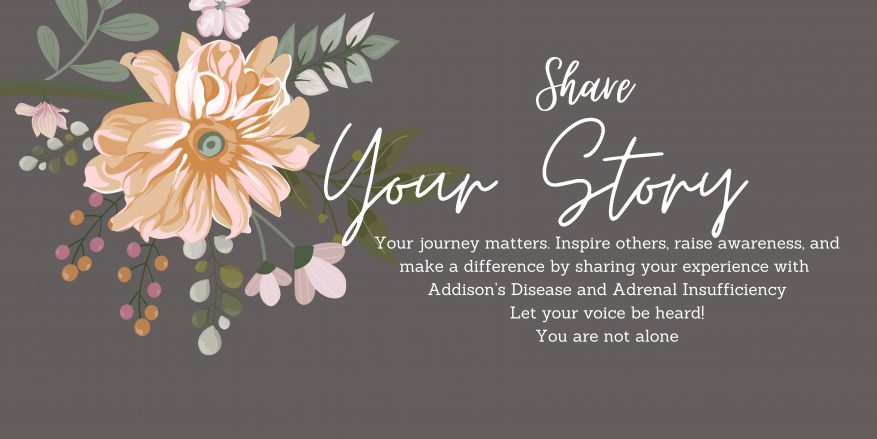Addison’s Disease and Adrenal Insufficiency
Addison’s disease and adrenal insufficiency are rare, life-threatening endocrine conditions in which the adrenal glands cease to function properly. This means the body no longer produces enough essential steroid hormones—such as cortisol—that are vital for health and survival. Without diagnosis and proper treatment, adrenal insufficiency is fatal.
There are three types of adrenal insufficiency:
- Primary adrenal insufficiency (Addison’s disease): where the adrenal glands are directly damaged.
- Secondary adrenal insufficiency: caused by problems in the pituitary gland, which fails to signal the adrenal glands to produce cortisol.
- Tertiary adrenal insufficiency: originates in the hypothalamus, disrupting the hormonal signalling pathway even further upstream.
Treatment involves lifelong steroid hormone replacement, usually taken as tablets at carefully timed intervals throughout the day to mirror the body’s natural rhythm. People living with these conditions must become “expert patients”—learning to manage their medication and increase their dosage during illness or stress, following the Sick Day Rules. Many also carry emergency hydrocortisone injection kits to prevent potentially fatal adrenal crises.
Although some individuals may experience challenges, particularly if they have additional health conditions, most people with Addison’s and adrenal insufficiency go on to live full and active lives with appropriate management and support.
You can learn more about the conditions here:
👉 What are Addison’s Disease and Adrenal Insufficiency?
About The Addison’s Disease Self-Help Group (ADSHG)
The Addison’s Disease Self-Help Group (ADSHG) is the UK charity and Patient Support Group for people affected by Addison’s disease and adrenal insufficiency. We envision a world where these conditions are recognised early and managed effectively—so that everyone affected can live confidently and thrive.
Our work is centred on three pillars: support, connect, and advance.
We support individuals and families on their journey to becoming confident and informed patients. Through partnerships with leading adrenal specialists—including the Addison’s Clinical Advisory Panel chaired by Professor John Wass—we raise awareness, influence policy, promote clinical understanding, and fund vital research.
“The ADSHG is unique in the world both for pushing for good care and interacting with medics and medical professionals. Its advocacy is amazing and very effective.” – Professor John Wass
We encourage people to join the charity to receive our Welcome Pack, which includes all our leaflets, publications, and the latest expert advice to help people be aware, be prepared, and be understood.
📦 Learn more about membership and what’s included in the Welcome Pack here:
👉 Join the ADSHG
For extra information and support please contact
Addisons Northern Ireland (Facebook Page and support group)
Addisons Self Help Group (Facebook and Addisonsdisease.org.uk)


Living with Addison’s Disease:
Addison’s disease is a rare, serious, and lifelong condition that affects the adrenal glands, which sit just above the kidneys. These glands are responsible for producing two vital hormones: cortisol and aldosterone. In Addison’s disease, the adrenal glands become damaged—most commonly due to an autoimmune response—and fail to produce enough of these hormones. It affects roughly one in every 10,000 people in the UK.
The symptoms of Addison’s disease can be debilitating. I experienced extreme fatigue, dangerously low blood pressure, unintentional weight loss, a persistent lack of appetite, hyperpigmentation, low mood, muscle weakness, and a general lack of motivation. Because Addison’s is autoimmune in nature, it often comes hand-in-hand with other autoimmune conditions as well.
For many years, I lived with these symptoms without a clear diagnosis. I was misdiagnosed multiple times—doctors believed I had epilepsy, depression, ME/CFS, among other conditions. It wasn’t until 2008, more than 20 years after the onset of symptoms, that I was finally diagnosed with Addison’s disease. It was a bittersweet moment—devastating to confirm a chronic illness, but also a relief to finally know what was wrong.
The only treatment for Addison’s is lifelong steroid replacement therapy. These medications help replicate the hormones my body can no longer produce, but they require constant management. When I’m ill—even something as common as a cold or a migraine—or when undergoing surgery or dental procedures, I must double my medication to help my body cope with the added stress. Without this, my cortisol levels can drop dangerously low, very quickly.
Because of this risk, I carry an emergency hydrocortisone injection kit with me at all times and have been trained by endocrine nurses on how to self-administer it. This training can be life-saving, especially in the case of an Adrenal Crisis—a medical emergency that can lead to seizures, coma, or even death if untreated. Adrenal crisis can be triggered by illness, physical stress, injury, or even psychological shock. If I suspect a crisis is happening, I need to inject myself and call an ambulance immediately.
Living with Addison’s has completely changed my life. While some people are able to continue working, I had to give up my job due to Addison’s and related health issues. This loss of livelihood had a significant impact on me—not just financially, but emotionally. There’s a deep grief in having to let go of the life you once had and adapt to new limitations.
Every person with Addison’s experiences it differently. There is no “one-size-fits-all” rule for managing this illness. What we do learn, often through trial and error, is to listen closely to our bodies. Learning our limits is vital, and pushing beyond them can have serious consequences.
One of the most important sources of strength for me has been connecting with others who live with Addison’s. Peer support has been invaluable—there’s something powerful in speaking with someone who truly understands what you’re going through.
I share my story in the hope that it helps others—whether you’re newly diagnosed, still seeking answers, or supporting someone with Addison’s. Early diagnosis, proper management, and awareness can save lives.
